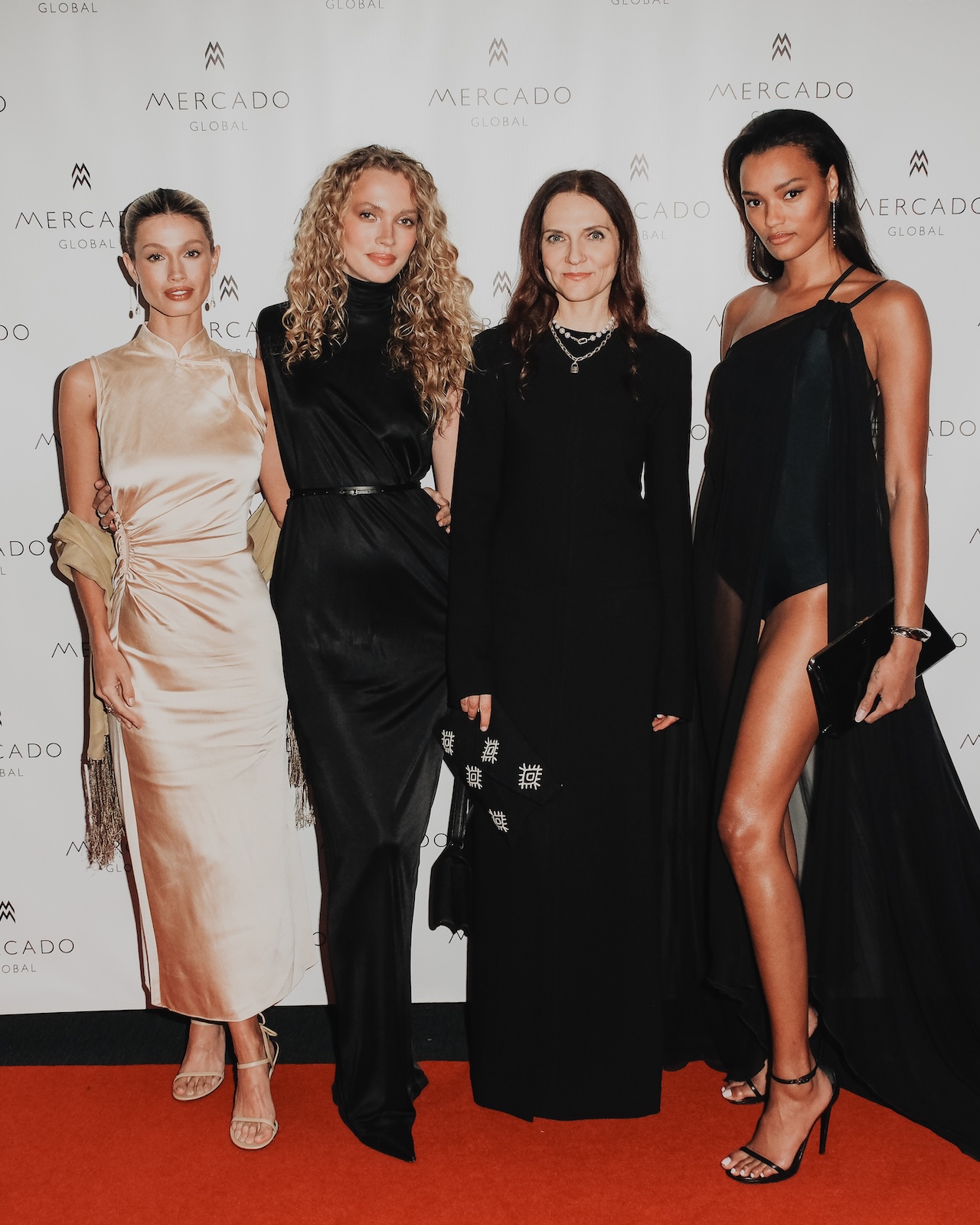

At GRAZIA USA, we’re dedicated to spotlighting the trailblazing women shaping our world — and there’s no better time to celebrate their achievements than during International Women’s Month. This March, we turn our focus to Julia Kisla Taylor, the powerhouse CEO of The LIONS, whose commitment to empowering women extends far beyond the fashion industry.
Kisla Taylor was recently honored at the Mercado Global Fashion Forward Gala for her transformative work supporting Indigenous women artisans across Latin America. Under her leadership, The LIONS has championed initiatives that go beyond talent management, fostering partnerships that prioritize sustainability, diversity, and inclusion. From her groundbreaking work with the Clinton-Bush Haiti Fund to empowering Rwandan women through UN Women, Kisla Taylor’s career is a testament to the power of combining business acumen with social responsibility and her dedication to empowering women globally.
Beyond her executive role, Kisla Taylor leverages her platform to drive meaningful conversations. As a contributing writer for The Fashionography, she addresses cultural and socio-political issues within the industry. Her partnership with Fashinnovation reflects her belief that technology and media can unite to create lasting change. Through every initiative, her mission remains clear: to uplift voices that are often overlooked and to create pathways for long-term economic empowerment.
In our exclusive interview, Kisla Taylor opens up about the driving forces behind her career, the future of diversity and sustainability in fashion, and the profound lessons she’s learned while advocating for women worldwide. Keep reading as she shares her insights, challenges the status quo, and offers invaluable advice for the next generation of women leaders.

GRAZIA: You’ve made such a remarkable impact in empowering Indigenous women artisans across Latin America. What initially inspired you to focus on this cause, and what has been the most rewarding aspect of this work?
JULIA KISLA TAYLOR: Thank you! I think it’s important to emphasize that impact is never the result of one person — it’s the product of many hands and hearts working together. And there are definitely a lot of compassionate people who lend their time, expertise and resources which contributes to Mercado’s success.
What inspired me initially was the leadership behind this mission. Ruth Alvares DeGolia, the founder of Mercado Global, has an incredible ability to transform vision into action, which often makes all the difference between aspiring to create change and actually achieving it.
The most rewarding aspect has been seeing how this work creates a ripple effect. It’s not just about helping women earn a living; it’s about giving them the tools and confidence to become leaders in their own communities. When you see women making financial decisions that secure their futures and their children gaining access to education, it reminds you that this work is about laying the foundation for generational change. It’s about building a future where women everywhere have the tools and agency to rewrite their own narratives — and by extension, the narrative of the world.
GRAZIA: As a leader at The LIONS, you’ve helped shape narratives around diversity, inclusion, and sustainability in the fashion industry. How do you see the future of these values evolving in the next decade?
KISLA TAYLOR: I believe the goal must be to move beyond “initiatives” and make these values intrinsic to the fabric of how the fashion industry operates. Yet, with the new administration, we are witnessing a troubling shift — a rush to cancel these principles entirely, throwing the baby out with the bathwater.
In fashion, creativity thrives on a wealth of perspectives that continually challenge the status quo. How can we expect to innovate with a room full of people who share the same experiences, outlooks, and privileges? Diversity and inclusion aren’t about meeting some racial quotas or settling for mediocrity. They’re about casting a wider net, reminding ourselves to look beyond traditional spaces, and uncovering talent that’s been overlooked simply because no one thought to look there.
Equally urgent is the issue of sustainability. Are we content to continue collapsing under the weight of our own unconscious consumerism? Should we keep passing the buck until there’s nothing left? Why is that considered an acceptable practice? Asking these questions isn’t radical — it’s responsible. Fashion, like any industry, must take accountability. Profit and accountability aren’t mutually exclusive — responsible practices ensure both longevity and relevance.
I do not know how these values will evolve under the new administration, but as a forward-thinking agency, we will continue to invest in principles that drive resilience, foster creativity, and ensure long-term success.
GRAZIA: You’ve been a part of global initiatives like the Small Business Recovery Program in Haiti and the Economic Empowerment Program for Rwandan women. Can you share a defining moment from these experiences that shaped your leadership philosophy?
KISLA TAYLOR: Great question. If I had to pinpoint one, I’d say it’s the realization that true leadership isn’t about being at the center of every decision. In fact, you should often work quietly in the background. It’s about creating the conditions for others to thrive. It’s not enough to have a vision; you need to create an ecosystem where people can rise to take initiative, solve problems, and push boundaries.
Innovation and progress often come from letting go — trusting others to step into their strengths while offering clarity and support when needed. It also means allowing room for structured failures, where mistakes become opportunities for learning and growth, rather than setbacks.
GRAZIA: In celebration of International Women’s Month, how can the fashion industry better support and empower women, especially those in underserved communities or marginalized groups?
KISLA TAYLOR: Well, this is at the heart of DEI, isn’t it? The unique tension in fashion lies between visibility and authority. Women are hyper-visible — on runways, in campaigns — but visibility without agency creates only the illusion of progress. Fashion is built on rigid hierarchies, with power concentrated in the hands of a few who often operate in unchecked environments, allowing exploitative behaviors to persist.
To truly support women, we must consistently amplify their voices and stories. Without a voice, there is no agency; without agency, women are commodified, reduced to objects, and ultimately dehumanized. Breaking this cycle requires challenging systemic marginalization and ensuring women are decision-makers, not just symbols.
GRAZIA: What has been the most surprising challenge you’ve faced while advocating for Indigenous women’s rights, and how did you overcome it?
KISLA TAYLOR: In any nonprofit work, the challenge lies in the fact that, as humans, we lead busy lives and focus on what affects us most immediately. Extending empathy to distant issues or connecting the local to the global without context is difficult. It’s reasonable to wonder, ‘Why should someone care about Mayan women in Guatemala?’ But any local struggle carries broader implications. Perhaps the rights of Indigenous women feel far removed, but can you relate to the idea of empowering women through dignified work? That’s what Mercado’s mission is about. Isolationist tendencies are built on fantasies of a disconnected world, but our lives are deeply interconnected. Your life may not seem tied to Ukrainian freedom or women’s reproductive rights, but the inability to see these broader implications — such as how inequality or instability elsewhere fuels larger global challenges — will eventually lead to issues right on your doorstep.
GRAZIA: With your extensive work in both the public and private sectors, how do you balance business goals with social responsibility, and what advice would you give to other women in leadership roles?
KISLA TAYLOR: Balancing business goals with social responsibility starts with recognizing that they’re not at odds — they can and should complement each other. In my experience, long-term success comes from aligning your mission with your values. Social responsibility isn’t a distraction; it can be your strategic advantage.
For women in leadership roles, my advice is to trust your instincts. Intuition is often undervalued in traditional leadership frameworks, which tend to favor pragmatism. But intuition isn’t a weakness — it’s a powerful tool for navigating uncertainty and making decisions in complex environments. Leadership isn’t about data or even strategy; it’s about understanding people, anticipating needs, and seeing connections others might miss. Intuition allows you to read between the lines and act decisively when there’s no clear roadmap. It’s not about rejecting pragmatism but complementing it with a perspective that’s deeply human and adaptive.
Plus, intuition is a competitive advantage for women in a predominantly male world. So, go ahead and lean into it.














